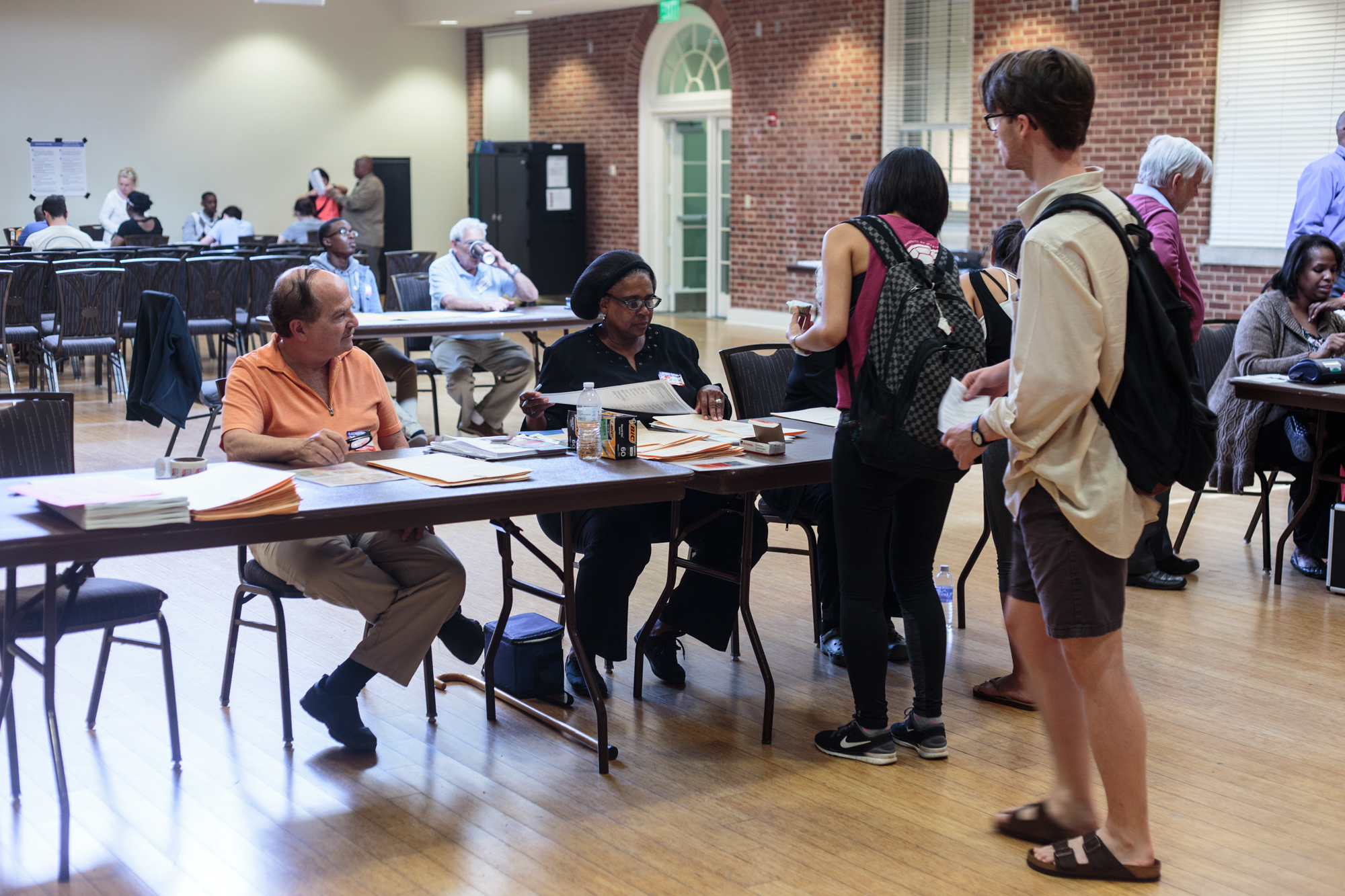By Darcy Costello and Grace Toohey
Frontrunners Donald Trump (R) and Hillary Clinton (D) won Maryland’s primary election Tuesday, as Rep. Chris Van Hollen (D) defeated Rep. Donna Edwards (D) for Sen. Barbara Mikulski’s soon-to-be vacant Senate seat.
Five Northeastern states — Connecticut, Delaware, Pennsylvania, Rhode Island and this state — held their primaries Tuesday. Trump swept the contests and Clinton won all but Rhode Island, as the candidates added to their respective delegate leads over competitors Sen. Ted Cruz (R), former Gov. John Kasich (R) and Sen. Bernie Sanders (D), who won Rhode Island.
This state hosted a heated race between Edwards and Van Hollen for Mikulski’s seat. The two representatives, both from Washington suburbs, polled closely for months ahead of Tuesday’s primary, in a race featuring interest groups and elected official endorsements, amid questions about the importance of identity politics for the Democratic Party.
In the general election, Van Hollen will go on to face the Republican candidate for Senate, state Del. Kathy Szeliga, who won the nomination Tuesday. Maryland has not elected a Republican senator since 1980.
Former Lt. Gov. Anthony Brown (D) and state Sen. Jamie Raskin (D) were able to pick up the Democratic nominations for the U.S. House seats left vacant by Edwards and Van Hollen, in Districts 4 and 8, respectively. All other House seats will most likely be won by their incumbents, who each picked up his party nomination.
Though polls in this state were originally scheduled to close at 8 p.m., a Baltimore City Circuit Court judge ruled that four polling places in Baltimore that were late in opening should remain open until 9 p.m. The Maryland Board of Elections delayed the release of results until all precincts were closed.
At this university, voters remained at the polls until almost 8:30 p.m. in the Stamp Student Union, where 1,042 registered Democrats and 209 registered Republicans cast ballots, according to the precinct judge.
Clinton’s victory was not a surprise to university government and politics professor David Karol, as Clinton has had past successes in states with closed primaries. This state also has a large democratic, African-American constituency — a demographic that has turned out in large numbers for Clinton nationwide, he said.
“In closed primaries, activists can’t swing votes [like in caucuses] and independents can’t vote, so that’s the best format for Clinton,” he said. “Put those two factors together: closed primary and large African-American vote — it’s perfect for her.”
A Sanders aide told The New York Times that the former senator and his advisers planned to “reassess” his candidacy after the five contests Tuesday, but maintained he would stay in the race until this summer’s Democratic National Convention.
“It’s going to be difficult for Sen. Sanders to remain credible in the race,” said Irwin Morris, a government and politics professor at this university. “The chances of having a contested convention on the Democratic side are much lower.”
The Republican National Convention, however, could have much more sway in deciding its candidate, said Mike Hanmer, research director of this university’s Center for American Politics and Citizenship.
“Under normal circumstances, it would be a wrap based on what [Trump’s] been able to accomplish by now, but there’s such strong interest, even from Republicans, that they’re still working on eliminating his chances,” Hanmer said. “Things that can get divvied up with three people running. …There’s still going to be a long way to go.”
On the Senate side, Karol pointed to the 2006 primary election for an open Senate seat as a similar dynamic to this year’s Edwards-Van Hollen faceoff. In the 2006 contest, then-Rep. Ben Cardin (District 3) defeated then-Rep. Kweisi Mfume (District 7) for the Senate seat Sen. Paul Sarbanes vacated.
“That primary was also competitive and also featured a white male candidate — the choice of the establishment — against an African-American member of Congress,” Karol said. “The demographics of the state haven’t changed, and so similar racial polarization in the primary is going to emerge, probably.”
Regardless of the primary’s outcome, though, Karol said he believes the Democratic candidate, now identified as Van Hollen, will go on to defeat the Republican challenger and become the next senator. Despite a 2014 election that saw the state elect Gov. Larry Hogan (R), there’s no sign that there’s a strong enough Republican contender, he said, leaving the candidate in an “uphill battle” in a state where registered Democrats outnumber registered Republicans 2-to-1.
“Given the partisan distribution in Maryland, it makes more sense that the real competition is during the primary,” Morris said.
In the weeks leading up to the primary, Van Hollen was the only major candidate to visit campus, despite appearances ahead of the 2008 primary from then-Sen. Barack Obama at the then-Comcast Center and Republican hopeful, former Arkansas Gov. Mike Huckabee, at the Stamp Student Union.
Though Clinton visited campus to endorse democratic gubernatorial candidate Brown in fall 2014 and Edwards spoke at a UMD College Democrats event in November, neither candidate returned to the campus to rally support for Tuesday’s vote.
Morris suggested the lack of campus campaigning this primary cycle could have something to do with the composition of college students, as many are not registered with their on-campus address or are out-of-state students.
This year’s candidates’ main bases are also relatively consistent across states, Karol said.
“Democrats are for Clinton, independents for Sanders; old voters are for Clinton, young voters for Sanders,” Karol said. “This has been true state after state, so I don’t think there’s any great mystery about who undergraduates would support.”
This state’s primary often doesn’t play a large role in deciding presidential nominees because it falls later in the calendar, but this year it was one of the outliers, Morris said. Particularly in the Republican race, every state matters, he said. Indiana and California are coming up in the following weeks.
“We’ve had elections where more or less we knew the nominees. … [This year], Maryland is significant on both sides,” Morris said. “Certainly these are consequential ballots.”



